he/it — i think about things and it eats me up and then i write it and now you have to see it too. mostly about fandoms i like.
Last active 60 minutes ago
Don't wanna be here? Send us removal request.
Text
Susie and freedom
Deltarune is consuming me, the symbolism around her is eating my brain and i love her to death. so, Susie.
spoilers ahead all the way to chapter 4's ending and potential speculations for the future.
I did write about that in a reblog like, two days or so ago but i wanted to detail it.

Susie is Freedom and it's so obvious.
she does not abide by the prophecy: there's the first switching side moment, when she decides to be a bad guy with Lancer instead of following the prophecy, there's also her asking Ralsei to take off his hood even though he's represented wearing it in the prophecy (could be linked to him not being the prince from the prophecy too). There's obviously the clear "we're not gonna let that happen" when she finds out about the prophecy's ending too and her refusal to accept the tragedy.
there's the freedom she brings to Kris by her friendship (see the actions that are so obviously theirs, like the drinks at church. see also the mirror dialogue "for some reason, seeing susie standing with you… You feel like things might actually be ok." (and yeah there's the whole question of who 'you' is in these lines but i'm pretty positive these are about Kris even if the Soul is in control).
there's the Dark World adventure where she constantly is the free and freeing one: in Lancer's castle, Noelle in Queen's tower, Toriel in chapter 3 and almost Undyne (she's certainly the one fighting the most out of her own freewill), then chapter 4 where she delivers a letter on Gerson's behalf to his son, therefore delivering one of his guilt and the other of his sense of duty (kinda, not exactly sure what to call it because insecurities feel too tame for what it is).
She also challenges the rules of the Dark World. In chapter 3, despite Tenna's comment on censorship, she can and does write ass as her name and has a "kiss the my ass" on her apron. Instead of just throwing Kris at the Titan at the end of chapter 4, she jumps with them, even if they are the only one able to seal the fountain. She learns a healing spell and refuses to give up despite not being meant to.
In the Light World, she's constantly defying expectations (see Alphys thinking Susie will make fun of her for her juice combo when she's just kinda curious about it) and also is the savior: she fights Berdly and Mayor Carol for Noelle's freedom. Also, in a way, since she's the one distracting Noelle, she's the one to give Kris freedom of action (or tries, because Kris does not have half a second's worth of freedom in this god forsaken game).
MEANING! the great power of contrast, Susie has so much more freedom than ANYONE ELSE. She fights for a lot of them though!
Kris is trapped by many things, including the Soul, that small town where they obviously don't fit anymore and that voice on the other side of the phone, and the promise they made. Which Susie fights every time: the freedom she brings through her friendship, the reaching them even at their worst (see the "Kris is surprisingly good at flirting" which stops them from their trying to murder the Soul and the mirror dialogue again).
Ralsei is dutifully abiding by the prophecy and unable to escape his role, at least partly because he doesn't try until Susie makes him (when he tells her he'll try to be more honest with her and Kris in the future in chapter 4). He doesn't even try to exist for himself ("we must not make the lightners worry", "i don't need a room") and every time she reaches out to tell him off (telling they're real friends, planning a surprise for him and trying to arrange him a room).
Noelle has her father at the hospital, her strict and potentially abusive mother, Berdly's creepy behavior towards her, her own expectations, even Queen's obsession to trap her. Susie fights all of these, by being there at the hospital (even if we bring her), telling her mother off, telling Berdly off and literally rescuing her out of Queen's grasp like a romance novel.
Herself. No one frees Susie. She breaks out of jail and the mold on her own, encouraged by her own will to do just that. She sees freedom and reaches for it, all on her own (well, we're with her, but she goes for it out of her own volition). She learns piano, her spelling is bad but she writes the letter for Gerson, she goes to church and immediately ditches the church clothes when she feels trapped in them.
I love her your honor, she is so brave.
And yeah, that opens an entire conversation about can she subvert the prophecy or is it going to catch up with her dramatically? Is she even the girl from the prophecy? Can Ralsei and Kris escape the prophecy? Can Kris and the Soul escape each other? (because we also did not choose Kris. We specifically didn't choose Kris actually, but our vessel was discarded.) And from there, we expand to the rest of the Light World: can Kris and Susie escape their own backgrounds and families, can they grow past their circumstances, can she lift Kris up the same way she does when they're climbing, offering a safe spot and tossing them up towards greater heights?
Or is this all going to end in tears with the prophecy overpowering her freedom? 'cause i would cry so bad
#deltarune#deltarune spoilers#deltarune chapter 3#deltarune chapter 4#deltarune analysis#deltarune thoughts#deltarune susie#susie deltarune#kris deltarune#i love her so bad she is such a beautiful character and i would kill for her#the roaring knight watch out
49 notes
·
View notes
Text
amazing take
i just wanna add
Susie is freedom.
Ralsei is trapped by the prophecy and his status as a darkner.
Kris is trapped by the soul and the promise they've made to the person of the other side of the phone.
Susie is just there. She says "fuck you and fuck this" all the time, she's the one who challenge the prophecy at every turn (refusing to be a hero then shattering the prophecy, that and her refusal to let Kris do the sealing of the titan alone although she can't really do anything about it herself, like, she's always the one who acts out of her own free will) and also everything else! She fights Berdly and Noelle's mother for Noelle's sake, Susie takes freedom in her own hands and brings it to her people.
Might be dramatically reversed in the future, or could fail and be devastating, but up to this point, I absolutely count on her to be the catalyst.

it honestly fucks me up that susie is the optimistic one. enough to be called as having hope crossed on her heart. that SHE brings hope to ralsei, hope that maybe, just maybe, things can be different. that their story and fate isnt predetermined and inevitable. ralsei tries so hard to be the hopeful one, the one filled with optimism, to see the bright side in everything but he cant. he cant! he knows how this story ends. and susie, the mean, sarcastic aggressive person with an attitude is the one to say FUCK THAT. you dont have to be afraid. because im not, and im not going to let it happen. its just so... AUGH. I LOVE THEM!!!
#deltarune#susie#deltarune chapter 4 spoilers#deltarune chapter four#i love them your honor#deltarune spoilers
1K notes
·
View notes
Text
The Circe Saga: misandry and power
aka, why I really like Epic’s depiction of Circe!

Greek mythology is highly sexist and misogynistic. This is not up for debate. Therefore, any woman who is shown as powerful in a Greek myth must invite curiosity and some reflection about this power.
Retellings of Greek myths are always confronted with their base material presenting these issues and it’s always a bit of a gamble to try and balance it out.
Circe’s character isn’t exactly that much of a challenge since she is a powerful woman in the original myths already. The challenge lies in keeping her strong without denaturing her character: Circe is a caring woman, towards her nymphs, ruthless and unforgiving in her quest to protect them and herself. Her story is one linked to men’s cruelty and the real difficulty lies in keeping this trauma without defining her entirely around it.
Epic does a good job of this, by defining her first and foremost not as a betrayed, hurt witch but a power to be reckoned with, a queen to the Nymphs, a sorceress. You’d have to ask Jorge how he went about designing his iteration of the character, I’m not in his head. What I know is that Epic!Circe is a good representation of her and I’d like more of it actually.
What I want to tackle is the resolution of the conflict between her and Odysseus and how he convinces her that he should get his crew back. The musical avoids falling into the ‘man fixing a woman’s trust in men’ trope to my greatest pleasure.
Odysseus never convinces Circe that his crew are better men: they did fall for her trap after all. He never tries to tell her they’re not pigs or not dangerous to women or not scarred by war and its violence, therefore carrying it with them. What he tells her isn’t that she’s misunderstanding them, but that Odysseus guarantees that, if she lets them leave, they will not turn back.
This is not about morality but control. Circe’s beliefs are not put into question, Odysseus doesn’t prove that his crew are kinder men or even that he is.
See, Circe’s character is defined by her power and her control. She is repeatedly referred to as such; her first song is about being a puppeteer; when she tries to seduce Odysseus, it is a power struggle; he begs her for mercy and doesn’t threaten her; when Odysseus and his crew leaves, no one doubts her power. Odysseus got divine help to win against her, and he didn’t win against her, his illusion beat hers.
Odysseus is not powerful. Because “Back at home, my wife awaits for me, she's my everything, my Penelope and she's all my power, all my power”. When Circe tries to seduce him, he is tempted! Circe is a beautiful woman and the man has been at war for ten years and at sea for an extra two, he is tempted by her advances. But he is first and foremost Penelope’s husband and she is her power. For all that he wants Circe, he has just enough control to not fall to her temptation.
There is no changing her belief or methods, this is about power and where it lies.
This is all a power struggle, and, at the end of the day, Penelope wins.
Odysseus and Penelope are amazing like that, because she’s the power and he’s got control. These are the two qualities that Circe values, that and family.
So essentially, Odysseus has enough control to maintain himself throughout her manipulations, and Penelope exerts enough power on him that Circe is fairly confident that he will not hurt her or her nymphs. He also has enough power over his crew to ensure they will not hurt them either.
Therefore, when he tells her Poseidon’s after him – and considering Poseidon’s record of violence towards women –, Circe decides to help him.
And just so we’re extra clear, this is not Circe stepping back and considering men as ‘not that bad’. She thinks that there might be room for men to improve if they learn respect and to perceive women as powerful as well, but that doesn’t disprove her current opinion. Men could get better but they are not better than she thought.
All in all, this is a struggle over power and control and Circe is challenged by Odysseus and Penelope.
And yeah, he does get a dagger at her neck. But she does not lose, nor is she rendered powerless and fearful when that happens, she just switches strategies. She is not just powerful, she is resourceful and constantly in control.
I really like this saga because it’s a genuinely very respectful depiction of Circe as a woman. And yeah, the femme fatale isn’t an uncommon trope, but it’s still a nice iteration of it, and a really spot on take on it. Femme fatale are not about being hot but in control in a world of men, and Circe’s a really good representation of it.
#epic the musical#epic circe#the circe saga#epic analysis#epic odysseus#epic penelope#penelope out there winning fights she doesn't even know about
19 notes
·
View notes
Note
Hi Prideknights!
You're based in Europe, right? Could you help out signal-boosting this European citizens initiative to ban conversion therapy in the EU?
https://eci.ec.europa.eu/043/public/#/screen/home
I don't think I have to explain the horrors of conversion therapy to you, so let me explain how this initiative works.
For it to get taken seriously by the EU, we need two things:
7 countries need to reach the minimum threshold of signatures for their country. We're currently at 6 out of 7! Slovenia only needs 300 more signatures to become country number 7!
We need a total of 1 million signatures. This might look daunting, but there days ago we were still at 200.000. Yesterday we were at 450.00. We are at 535.000 right now. So we have a long way to go, but we are moving fast!
The deadline is in a few days, on May 17.
Anybody with a European citizenship can add their name to the pile! If we reach the right amount, the official citizen initiative will be put before the EU Commission.
With lgbtq+ rights getting rolled back across the world, including Europe, there is no time to lose to demand stronger protections.
MAY 14, 2025 (VERY RELEVANT) SPREAD. THIS. LIKE. WILDFIRE!!!
3K notes
·
View notes
Text
Is Jinx a terrorist?
A dive into definitions, political science and arcane.
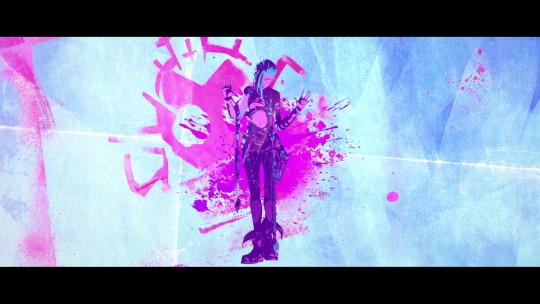
Hello there! Time to get controversial about some of the least controversial aspects of Arcane! Why am I picking an umpteenth fight that no one cared for? Because I can, thank you.
Jinx has been called a terrorist unequivocally by the entire fandom and I haven’t seen anyone – hardcore fans or arcane criticals – discuss the accuracy of that claim.
I’m gonna have to put a couple disclaimers in there already.
1- I’m a master student in political science. While that gives me some credibility in what i’m saying (that, and the fact that I'll be quoting my sources), that does not immediately make me right, this blog is not peer-reviewed (lmao) and you should have critical thinking while reading.
2- This is not me promoting or endorsing terrorism. I aim to have a neutral take on it, following the methods of scientific writing. I do have my own moral judgement on the matter, but it’s not the focal point of this blog. Just because I will write in a very neutral manner does not mean terrorism stops being terrorism.
3- My incoming points are argued towards a work of fiction, and you must be careful if you decide to translate that reading to the real world. It certainly isn’t a complete and exhaustive view of terrorism and politics certainly require you to have critical thinking and better source than a tumblr blog (hence the quoting my sources part).
4- The goal here is to give various ways to read Jinx’s actions, not to give a definite name and judgement on them. This text is entirely subject to your criticism.
With this out of the way! Spoilers ahead for the entire show (and while we won’t really discuss season 2 act 3 here, there will be spoilers anyway) and let’s get into it.
And we get into it through a definition (everyone’s favorite thing, I know). For a proper definition, I looked into the Encyclopedia Britannica, the article on terrorism written by John Philip Jenkins.
In this article, he says: “Terrorism is not legally defined in all jurisdictions”. Which. ah. That doesn’t help. No, to be fair, he does then say “Terrorism involves the use or threat of violence and seeks to create fear, not just within the direct victims but among a wide audience”.
Later down the line, we can read: “In order to attract and maintain the publicity necessary to generate widespread fear, terrorists must engage in increasingly dramatic, violent, and high-profile attacks. These have included hijackings, hostage takings, kidnappings, mass shootings, car bombings, and, frequently, suicide bombings. Although apparently random, the victims and locations of terrorist attacks often are carefully selected for their shock value.[...]The goal of terrorism generally is to destroy the public’s sense of security in the places most familiar to them. Major targets sometimes also include buildings or other locations that are important economic or political symbols, such as embassies or military installations. The hope of the terrorist is that the sense of terror these acts engender will induce the population to pressure political leaders toward a specific political end.”
Yes, it’s a bit long, I’m sorry. It matters that y’all know that because that’s what I’ll be referring to as terrorism: dramatic, violent attacks that target symbolic places; military and civilian populations alike to instill fear in populations. The ultimate goal is (usually radical) political change.
This is really important! Terrorism is a method. NOT an ideology. Terrorism is in service of an ideology (it has been used by anarchists, communists, fascists, the KKK, ISIS… these ideologies are not alike) and we can separate both aspects of the fight. Namely, you can think one method is great but the ideology of the group using it sucks or vice versa. It can be used by states against their population to subdue any opposition; by revolutionary groups, by religious groups, individuals… Some ideologies are closely linked to terrorism of course, but you get the gist. Method.
And just because something isn’t terrorism doesn’t bring people back to life. Some attacks aren’t terrorism, but they’re still deadly and not any less or more morally condemnable.
Since we’re looking specifically at Jinx in this post, we’ll only discuss her actions. We could expand that conversation, but it’s not the point here and now.
Jinx does multiple acts of violence, and I’m gonna list off the ones we’ll examine here.
Season 1 episode 4, the fight between Jinx and the firelights when smuggling shimmer into Piltover.
The attack on the tent when she steals the hexgem during progress day. (also episode 4)
Episode 7, the attack on the bridge right before her fight with Ekko & the explosion that almost kills both of them.
Episode 9 and her attack on the Council.
Season 2 episode 3, the clouds of Grey sent through the vents to Piltover by Jinx and Sevika.
We won’t discuss individual beefs: namely Cait’s kidnapping, all the times she fucks with Sevika, her fight with Ekko precisely because it’s individual and targeted. Terrorism implies aiming much larger and the goal is violence in symbolic places and on symbolic populations for shock value and fear mongering, it’s never just personal conflict.
First instance! The fight between Jinx and the firelights when smuggling shimmer into Piltover.
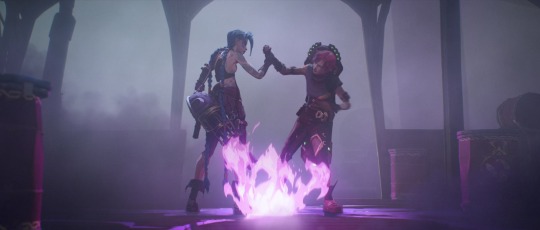
The goal here is to protect the cargo, not send a political message. The attack wasn’t planned, it’s an answer to a targeted strike on strategic interest. The goal is not fear, not political change. This is more of a routine fight between rival groups.
Verdict, not terrorism.
Second instance: the attack on the building when she steals the hexgem during progress day.
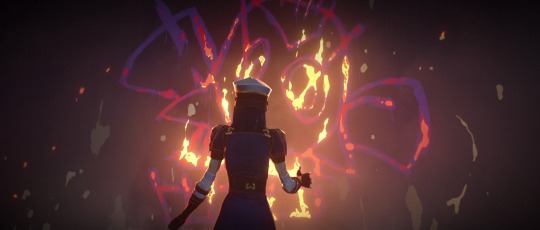
Attacks on places without victims are a bit of a grey zone in the definition, but there are victims, because Jinx does call for help, impersonating a lost young child to draw in enforcers.
It’s decently targeted on military populations (Piltover’s enforcers are obviously both police and military forces in Arcane), because Jinx was obviously aiming for them (you can’t kill someone’s parents in the fuck around part of your life and not expect an angry orphan once you reach the find out part). It’s symbolic, because this.
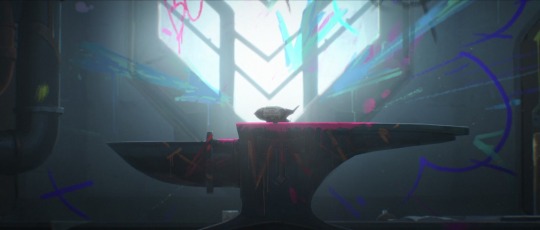
But it’s more mocking, taunting that it is meant to be scary.
Her goal is stealing the gem first and foremost, to impress Silco.
Verdict? Debatable. It can be read as terrorism, it can be read as a tactical strike against Piltover’s forces, it can be both. I’d love to hear your thoughts!
Third: the attack on the bridge, right before her fight with Ekko.
Attacks on the bridge are not that symbolic anymore, consequences of constant fights on said bridge. At this point, it’s as symbolic and surprising as finding a mine in a minefield is. Fork found in kitchen type of shocking. The symbolism is more in the weaponery, she uses the bugs engineered by Piltover.
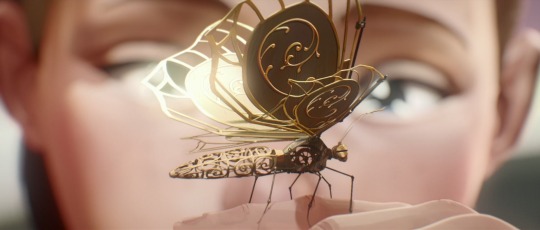

It’s targeted on enforcers, specifically the ones that will get in her way to get the gem back. It does not aim to instill fear. It does not aim for radical political change through fear.
By my books, not terrorism.
The explosion that concludes her fight with Ekko is ‘just’ a murder suicide attempt, not terrorism.
Fourth: episode 9, the rocket and the Council.

Ooh, spiky territory.
Hyper targeted strike on Piltover’s governing body – with debates over did she know they were in here, considering it was night + the lights were off –, meant as highly symbolic (tower of the Council directly, using hextech to power her rocket launcher), clearly meant as a shocking start to all out hostilities (“We’ll show them all.”), on technically civilian populations (although very specific people), and the goal is so obviously radical political change (as she’s walking in Silco’s shoes).
The question is, of course, the fear element. Is it her immediate intention to scare Piltover, or is this a targeted strike to weaken it?
We will never know because Arcane season 2 immediately forgets that this happened and that Jinx had thoughts and a political intent when she shot and then takes a severe turn away from the Zaun/Piltover conflict towards Noxus and magic so we don’t know.
I argue against calling it terrorism, because of how targeted it was, but both sides of the argument are interesting.
Season 2 now!
There are significantly less instances, because the show focuses on Viktor and Jayce a lot more than the sisters in season 2.
However, there is one specific instance of Jinx committing violence that is neither self defense or personal beef with a specific individual. I'm referring to the end of arc 1, with the rerouting of the vent to send the colorful clouds into Piltover.
Dramatic and shocking actions? check.
Highly symbolic? Jinx’s colors, reminiscent of her attack on the progress day of season 1, using the Grey through the vents (an invention of the Kiramman meant to pacify relations between Zaun and Piltover despite the many implications of still unequal power relations) check.
Targeted at civilians and military populations indistinctly, with the intent of doing damage? check.
Destroy the sense of safety in public spaces? considering where the attack happens: everywhere, including the streets and the peaceful gardens in Piltover; and the fact that the paint will stain and leave its mark, check, yes.
Aim for radical political change? check.
Aim to instill fear to subdue a population and force them into political change? Well, I’ve never seen a picture that said “we can reach you everywhere, expect us” as much as this one, so check, absolutely.
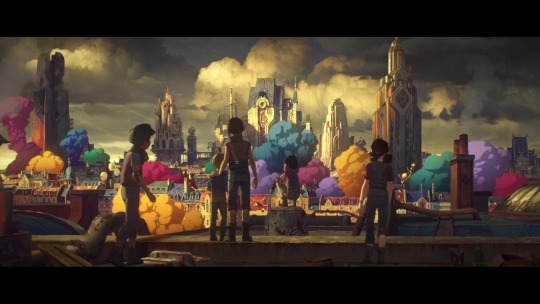
Yeah, this is terrorism.
While we don’t know if there are casualties from this attack, we do see a hurt child. Grey is insanely dangerous, it’s not unfair to assume that people with some breathing difficulties or a weak immune system would die from it. Ambessa doesn’t talk about it, so I’m gonna say no, else she would have instrumentalized it. However, just because no one dies doesn’t mean no one is hurt and it does not refute the terrorism accusation. (it’s still terrorism if it fails)
This specific attack is textbook terrorism.
…
…
But.
Right before Sevika triggers the explosion, Jinx yells “No! That’s not what these are for!” (or something close enough, i don't have my eyes on the episode right now)
so. what the fuck were they meant to be for. Did she mean wait until we’re all out of there, it’s not meant to be used as a weapon against Vi and Caitlyn but specifically on Piltover. Did she mean there was a completely different use she thought of for the vents and the bombs. If yes, I have no clue what it was meant to be used for, but sure.
Mainly, if she did mean she never planned to reroute the grey into Piltover, it means that she never tried to commit that terrorist action, and instead it’s Sevika who’s responsible for it.
Verdict, terrorism? yes. Jinx, a terrorist? well, question mark still stands.
So, should we call Jinx a terrorist?
Well see, I asked a question no one ever asked, sprinkled sparks of debate in a very agreed upon topic and I don’t even have an answer to provide!
And to delve a bit more into that method doesn’t equate ideology, reminder that you can agree with a fight for Zaun’s independence and freedom, support radicality in these actions and even endorse FICTIONAL terrorism and still wish the clouds were aimed at actual strategic targets. You can hate the entire thing, or only agree partway. It’s fictional and no one actually died in real life, so we have space for purely hypothetical, pointless debates over semantics and what-ifs that real life terrorism tends to cut short.
What do you think? please do share opinions, i need to know.
here’s the proper citation format for the article i used as my baseline definition for terrorism : Jenkins, J.P. (2025, March 18). “terrorism”. Encyclopedia Britannica. https://www.britannica.com/topic/terrorism.
(yeah i have been formatted to provide proper bibliographies in every paper i write)
#arcane spoilers#arcane season 2#arcane#arcane analysis#arcane piltover#arcane zaun#arcane jinx#jinx arcane#yeah we're just talking out there#what dyou think
10 notes
·
View notes
Text
Athena, Odysseus, mirror arcs and parallels
We like parallels in this fandom, so let me explore this one.


I’ve seen and read a lot of people talking about various parallels in the musical but i’ve yet to see about these two: Athena and Odysseus constantly mirror each other in a way. Both their arcs and stories across EPIC are constantly intertwined and they always meet in some way.
The first time they meet, they both try to trick each other: she disguises herself, he bluffs and it works. She’s looking for a student, he wants a mentor, their stories and ambition meet for the first time.
He convinced her because he knew who she was, he called her by her name. And when they split up, it’s when he fumbles his trap by revealing his own name to the cyclops after discarding her advice. So, when he steps away from her and her teachings — for decent reasons in Epic, he wants less bloodshed and he wants his men remembered —, she steps away from him.
They don’t see eye to eye because, when Odysseus thinks mercy and a kinder world are good, she sees it as weakness and calls him sentimental in a derogatory way. She wants him to finish the cyclops for he is still a threat, Odysseus can not bring himself to kill anymore, especially not an already injured and weak foe.
I really like that, although their actions mirror each other, the musical doesn’t forget Odysseus is a man and Athena a goddess. When he steps away from her, he ignores her advice once. When she steps away from him, she doesn’t talk to him for ten years.
Then, as Odysseus goes missing from the surface of Earth, stuck on Calypso’s island, Athena goes to check on his son. He wants to go home but he can’t, but she is free. They are far away but, through their affection for Ithaca and Telemachus, they still meet in a way.
(We could expand on the parallels Athena draws between father and son and how Telemachus recontextualizes Odysseus’ actions and allows her better understanding, therefore leading her to grant forgiveness but well, it’s been done before and it’s not the point right now.)
Then, both reach for each other at the same time.
I’ve seen talks about ‘how long had Odysseus been calling for her before she came to answer him?’, my own take on the matter is it’s the first time. He calls her because she’s here. He can feel her presence, that’s literally how they met. And even if he doesn’t realize it, even if it’s unconscious, even if he thought she hadn’t answered him, he calls for her and she reaches for him at the same moment.
(part of why I think that is absolutely because I like it more, yes)
And then, Thunderbringer.
Athena and Odysseus both face Zeus, are met with a challenge and face the Thunderbringer.
But when Zeus shows up to Ody, he is a very unwelcome addition to an already bad situation. When Athena faces him, it’s because she walked into his house asking a favor from him.
When Odysseus brings the lightning to his crew so he can live, Athena faces it head on so she can rescue her friend.
For both of them it’s a trial, and a painful one. But Odysseus comes out of the Underworld and the sirens’ territory and Scylla’s lair willing to be a monster, ready to torture Poseidon until he calls back the storm. Athena just left Ithaca and Telemachus, and defeats Zeus by calling to his mercy and kindness.
When they meet again, he’s fighting to reconquer his palace, she is by his son’s side to defend him. (sword and shield metaphors anyone?)
And he calls to her again, and she reveals herself. And now, she’s the one wishing the world would be kinder and he’s not willing to fight for it. (Forgive the man, he had still the suitors’ blood all over him when he hugged his son, he’s yet to see his wife again, he’s allowed to be too tired to care about changing the world.)
So yeah, I think they’re neat. They keep on meeting and mirroring each other, learning from each other and from their time apart.
Insert here some commentary about undying friendship and all.
#epic the musical#epic spoilers#still funny to tag spoilers for a millenia old story but it’s ok#epic athena#epic odysseus#epic telemachus#epic zeus
15 notes
·
View notes
Text
Eurylochus, responsibility and cowardice
Never thought I’d actually make an EPIC rant but here we are! Eurylochus is a character i’ve seen quite a few takes on, but i didn’t agree with any of them so lmao, here goes!
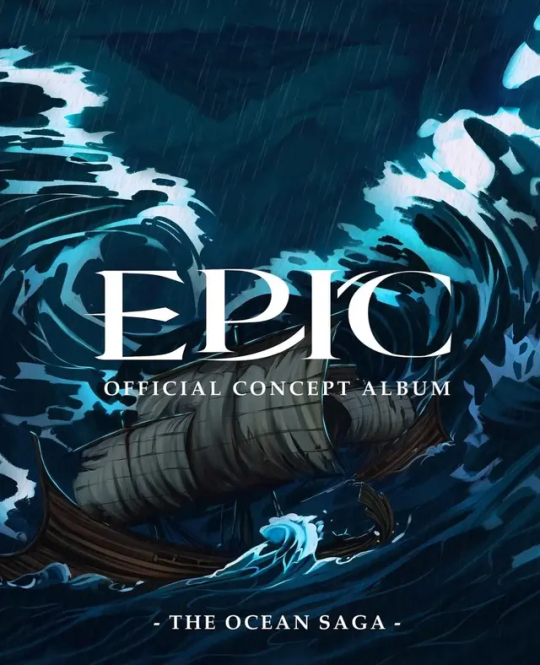

Eurylochus, as Odysseus’ second in command, should have been the incarnation of loyalty. Either to his captain or to the crew, both would be fine (standing with your ruler and not your people doesn’t make you a good person) (but it does make for interesting character tropes, looking at you, Dark souls II). But Eurylochus is as reliable as a burning rope bridge above a precipice, for both the crew and Odysseus.
Essentially, the deal with Eurylochus is a lack of will. He gets carried by whatever wind is the most comfortable on a given day and never makes a stand against the current — unlike, idk, Odysseus who literally stabs Poseidon.
And, you know, staying perched on your position without ever moving isn't a healthy or safe behavior, “open arms” would have killed Odysseus and even Telemacheus brings himself to violence.
But choosing a hill to kill and die on can be mandatory for survival. Radicality is something to be careful with, but when facing radical dangers, taking the middle ground every time means losing over and over again.
Refusing free will to hide behind a leader is how you get yourself in a sect, refusing free will to follow a wave is how you get yourself complicit to atrocities after all. (oh, politics, when did you get there?) (haha anyway)
So! Eurylochus.
Eurylochus is a character I've seen apologists for, haters, lovers… I argue here that he is primarily defined by his cowardice and refusal of responsibility.
I have to make a quick stop here to define cowardice: the behavior of someone who is not at all brave and tries to avoid danger (that’s from the Cambridge dictionary). It has a very negative connotation but i only use it here to define someone who fears danger and tries to avoid it. there's no moral judgment on my end on eurylochus' behavior.
Odysseus asks him to follow his lead without question in Luck Runs Out, and he does. When he opens the windbag, he does so under the pressure of the crew, because he can not make a stand for himself and prove his loyalty. He gets scared when Circe invites them in and runs away. When Ody tells him “you'd go back for me”, he's quiet. “Let's cut our losses and leave”, he says. But Odysseus goes back and wins. He wins on his own too, he didn’t ask Eury to follow him.
I think it genuinely is a turning point for Eurylochus, who is then willing to follow Odysseus without question. He's fine with going to the Underworld, he's fine with slaughtering the sirens, he's fine entrusting his life and future to Odysseus (because he does fill his ears with cotton in order not to hear the sirens, leaving every information in Odysseus’ hands).
He asks for reassurance when they reach the lair of Scylla, because he can probably tell something's off, Odysseus is not his normal self, he's silent and probably mourning already.
He confesses to opening the wind bag because he can not stand the guilt (and we could argue that he wants the responsibility of the consequences of that to go to Odysseus but also that’s prob overreaching).
Then, Odysseus makes the one mistake that cost him 7 years of his life.
He asks Eurylochus to light the torches and to distribute them among the crew.
This is what makes Eurylochus responsible for who died. And, for all that he's fine following a murderer and a dangerous man, he will not share the blame. “If you want all the power, you must carry all the blame”. Suddenly, the blood is on his hands and he chose whose blood, he had some margin of power and now she carries that blame. He is not only obedient and an accomplice by his silence, he has made a decision that resulted in death. And Eurylochus does not like that.
Blind obedience and silent compliance is comfortable, because it's not really his fault, is it. But now, because he chose who died, it is. So, Eurylochus is overwhelmed by his anger and guilt (and I believe he's honest in his distress) and, therefore, takes it out on Odysseus.
I'm not gonna bring politics into this but actually I am, it's easy to pretend it's not real when someone else is in charge, it's easy to pretend you're innocent when there's a hierarchy to protect you. It's easy to say “I was following orders” but the blood doesn't care who it stains. It doesn’t matter if you’re shedding it directly or through a ballot either.
Anyway.
Eurylochus.
When confronted with the blood he shed, he lashes out on Odysseus. And then, the crew and Eurylochus are hungry. And, well, there's food. And there's no listening to Odysseus, Odysseus betrayed him once already (i know, the irony. but, “if you want all the power, you must carry all the blame”, in his mind, he's innocent). And he's hungry, and there's food and the crew, the last entity he can hide into to avoid his responsibility, the crew is hungry.
And there's food. And so, for his own comfort and under peer pressure, he kills the cow.
When Zeus makes Odysseus choose, and we get the ever haunting: “Captain?” / “I have to see her.” / “But we'll die.” / “I know.”, I argue we're beyond every betrayal, guilt, resentment. This is not a captain and his crew, this is Odysseus and Eurylochus. The friends. Fear, betrayal, loyalty, none of these matter. Odysseus must go home. Eurylochus wants to go home. Only one of them is willing to make the terrible choice.
When facing overly powerful, violent and unforgiving entities, Odysseus chooses violence as an answer. Eurylochus, defined by cowardice and his want for comfortable obedience, his refusal of choice, dies by the hands of a god in need of entertainment.
And just so we’re clear: that does not make him evil, or bad, or more morally reprehensible than the next guy, or whatever. It makes him, essentially, a normal dude. We’d all be scared shitless in front of Gods, and making drastic choices and sacrifices does not make Odysseus a better person.
Eurylochus is essentially a middle ground: he’ll trust Odysseus but only until a literal god tells him his captain is hiding a treasure. And to be fair, wouldn’t we doubt too. He trusts him again later when he proves himself, but when he finds out he’s been fooled and the blood is on his hands too — I saw someone say Eury had probably given the torches to men he trusted and cared for —, he fights Odysseus. When it becomes obvious to him that they will not be able to come home, Eurylochus decides to stop chasing an impossible dream and goes for a very easily fulfilled need: food.
But choosing a middle ground in the face of absolute, violent and dominating power just means managing losses one after the other. If you choose to stay in this fight — keep pursuing Ithaca in this case — you have to opt for radicality yourself.
(also, come on man, these cows were literally the divine’s property, hunger must have made you so stupid lmao)
Eurylochus never stood a chance in Epic. Not when he found himself unable to follow either his captain or his crew and ended up being a discardable pawn in some gods’ game.
#epic the musical#epic the thunder saga#epic analysis#epic odysseus#epic eurylochus#epic the ocean saga#epic spoilers#“epic spoilers” just in case someone didn’t know how a millennia old story goes#no eurylochus apologist here#my boy did several instances of wrong#but also he was very scared
23 notes
·
View notes
Text
War as the great equalizer and Arcane
War is often defined at the greatest equalizer: everyone bleeds and dies the same after all. Having a common enemy is also often a rallying factor and helps create community despite conflicts.
However, in real life, not everyone is in fact equal in the face of war. There is a gendered experience of armed conflicts, an ethnic experience too and economic status also impacts one’s journey through war. Identities don’t disappear entirely and they still play a role in war time.
So, Arcane.

Spoilers ahead for the entire show.
also i get heated throughout this post.
Arcane uses the Noxian invasion as the common enemy™ to bring the two warring sister cities together, push them to get over their mutual hatred to ally for the greater good. The war is meant to be the great equalizer that helps them wipe the slate clean and start over, with equal forces in the council and a better mutual understanding.
Does it work? Well, Sevika does get a seat on the Council and it does stop the martial law.
But.
But.
I argue for a less hopeful take. I think Piltover’s domination over Zaun is still very much present throughout the war.
For one, equipment. Yes, Zaunites are given Enforcers uniform for protection. But Zaunites do not fight like enforcers. Enforcers can’t twist like Smeech, they don’t fight with Jinx’s flexibility, they don’t use the firelights’ hoverboards. Enforcers have a lot of brute force and special equipment. Zaunites are used to running a lot, jumping, fighting barehanded and with a lot less formal training.
Enforcers’ uniforms are blocks. They don’t favor flexibility. Zaunites are given uniforms that they do not know how to fight in, that they have to adapt to in a record time and figure out how to even move in. The weight is different, their range of movement is different, their speed is affected. And I’m not a fighter, I don’t know if this is all relevant and how it's relevant. All I know is, armor is a tool, and this tool looks really, really ill-fitted for the Zaunites.
(I wholeheartedly invite anyone who actually knows what they’re talking about to tell us some more on the subject).


Two, training. That ties closely with the previous point. Zaunites are taught to fight by enforcers, according to Piltover’s strategies. Both parties could complete each other’s training, both fought Noxus (for sparring purposes or due to the riots). And as we’ve said, Piltovians and Zauns are not moving the same way (it’s especially visible in season 1, when Vi and Caitlyn go back to the Undercity in episode 4 where the two girls do not run across the place at the same pace and through the same path). Zaunites have to copy their moves on Piltover’s strategies and are not shown to be teaching their own experience — reminder that they are the ones who had to put up with actual Noxian violence. I’m not saying it didn’t happen, but we didn’t see it so I very much think it didn’t. Side note, historically, dominated groups are very rarely invited to share their knowledge, let alone have that knowledge be seen as legitimate (you can see that in colonization, where indigenous knowledge is erased in favor of colons’ practices and opinions; it’s also seen when it comes to women’s words being disregarded in favor of men’s).


And finally, last but not least, the place of the battle. The barricades are set, therefore marking the area that the forces will be made to protect. Anything that is outside of this area is left to Noxus.
And the barricades are set on the bridges. Piltover is to be kept safe and used as a military bastion, Zaun is left to fend for itself. Had Noxus chosen to burn it to the ground, Piltover would have watched. That is, in itself, quite a brutal truth but on top of that, Piltovians ask Zaunites to help protect their home. This is again asking Zaunites for more sacrifices for Piltover’s protection, while Zaun is abandoned to Noxian forces.

And just so we’re clear, good war strategies would have seen a use of both cities. Guerilla techniques are used a lot in asymmetrical wars, when one party is significantly stronger than the other. They rely on the weaker party’s knowledge of the field, their abilities to move around and to lure their opponents into traps. These have been known to be efficient. I’m not kidding, guerrillas can see the slaughter of entire armies if played correctly (see wikipedia page on Napoleon versus Spain. These strategies defeated Napoleon, who, reminder, had a massive empire across Europe that he got through war and conquest.)
But no. Zaunites strategies, experience and even land are dismissed and sacrificed to protect Piltover!
(And yes, the writers could have thought about it, because they already did. Caitlyn uses the grey to clear the streets precisely because Zaunites rule their city and they can fight in it. It is also how Zaunites can resist the martial law so long.)


When Arcane pulls the War™ card on Pitlover and Zaun, it wants us to believe that it is enough to smooth over the differences between the two sides of the Pilt. But, and as many, many have said before, Zaun and Piltover were never warring sisters! The situation has always been that Piltover is an oppressive force on Zaun. It’s never been a war, it’s always been an oppressor/oppressed situation. The show tries to sell the ‘they were equals but angy all along!’ narrative throughout season 2 and it fails dramatically. The Noxian Invasion just exposes further the inequalities between the two cities, despite it being an attempt at making things right by the writers.
(and it doesn’t even make sense for the battle to happen in Piltover because Noxians were established in Piltover and only sent a team down to take down the commune and Jinx so technically Ambessa could have just snatched leadership ages ago before Mel came back and then try to take down Zaun only and for fuck’s sake we could have had a season 3 about resistance and guerilla in a Zaun vs Noxus war with actual time for a reconciliation between Zaun and Piltover through acknowledging Piltover’s oppression and making right by Zaunites, time for a Cailtyn/Vi proper reconciliation, actual Timebomb, Sevika with an decent arc and Jayvik in the commune getting some massive drama about the hexcore and magic and WHAT COULD HAVE BEEN)
(Yes, you can argue it’s because the show lacked time to show all of these elements, to which I answer fuck that, they had time for Timebomb, Isha and Vander/Warwick and all of these would easily have been sacrificed. Plus, it’s their job to make the show! I get to ask of them that they make a good one! And I get to say fuck Riot for making this show only to sell their videogame and not having respect from the integrity of the art and the artists! it’s capitalism’s fault and it can fuck off too.)
And how do I know I’m right and not making things up? None of the Zaunites we see going to war wearing an enforcer suit survives it, except Vi who, 1- only wears half of her uniform, 2- has a prior experience with it, 3- has her gauntlets, 4- has her sister showing up with a machine gun, what i guess is a hot air balloon and the rest of Zaun’s fighting forces!

(Grey zone for Loris by the way, because he looks like he’s in between the two cities and I can’t be sure if he’s piltovian or zaunite.)
“Oh but are you sure that’s what the writers’ train of thought was?” No! I’m pretty sure it wasn’t actually, but it is what the art is showing. A lot of things happen due to biases and implicit unknown social habits that we internalized without realizing it, that happens! Our job is to check those habits (because that’s how a lot of racism, sexism, ableism, insert here other discriminations there are too many of them, keep on happening!) and make sure we don’t spread shit messages that contradict what we actually want to say.
“Are you not reading too much into this?” No.
“The showrunners just wanted to add some angst and so they killed off characters we liked!” I don’t care. I don’t care what the showrunners wanted, I care about what happened in the show. I don’t care that it’s a show, the story deserves to be looked at, not as just a rushed show with poorly implemented centrist retcons, but as the universe, characters and arcs it is drawing. Arcane’s worldbuilding is great, its characters interesting and the story immersive, I get to interact with it as if the show was just a glimpse at a different world, I get to look further than what we got to see, I get to analyze this as if it was real. I don’t care that the showrunners meant something else or that I’m reading too much into it, to quote tumblr posts, “It’s not that deep but the ground is soft and I’m willing to dig”. And when I dig with that goddamn shovel, I see that Zaun’s oppression is far from being over.
I am passionate about this, yes.
I so want to talk about arcane by the way, and I can be calm when doing so. I didn’t want to in this post because it’s just me and google docs but I can be normal.
#arcane spoilers#arcane#arcane season 2#arcane analysis#arcane piltover#arcane zaun#arcane noxus#arcane critical#i just don't think arc 3 was good lmao
68 notes
·
View notes
Text
Stray thought about Caitlyn in S2 arc 3

spoilers and all that jazz!
For all that we can argue about Caitlyn's redeemable-ness and how the show depicts her, we can all acknowledge that THIS.

was a fcking day for her.
I just wanna say we must consider for a second the horrible shit show of emotions that this must have been for her.
The girl you were sleeping with and who showed you support turns out to be a spy and a manipulator, your mentor asks her to kill you, she drops "i enjoyed your warmth" as the last thing you'll ever hear, SHOOTS, weird ricochet noises and before you can even process what happened, her DEAD BODY drops on your shoulder and slides of you so you have a 10/10 view of her dead face.
And then you essentially have to get beaten up bloody, stabbed twice, pull the knife out in a last ditch effort to hope to create an opening for a woman who's had magic powers for a total of two weeks.
What a day!
#arcane spoilers#arcane#arcane season 2#caitlyn kiramman#arcane caitlyn#does not say anything about her own morality and does not equate a redemption arc#but it will not be said arcane was kind to any of its character in the history of forever
9 notes
·
View notes
Text
I really, really like Mel's arc actually!

I'm back on my defending hated character arcs bs!
spoilers for the entirety of Arcane.
There are multiple themes to Arcane. We will not discuss thematic coherence here, please and thank you.
Season 2's two main themes are "Love is always the way in and out of hatred and monstrosity" and "Your family is always with you".
This post is only about the second theme but the two intertwine all the time.
Your family will always catch up to you.
Vander is constantly brought back by his love for his daughters until all his memories and love are ripped away from him, leaving only Warwick.



Caitlyn becomes a monster out of love for her mother and uses her legacy to carry out "justice". Ambessa calls her forth because she is a Kiramman.



Mel Medarda lives in her Mother's shadow. Piltover is her attempt at building something away from her. Ambessa's arrival in season 1 crumbles her efforts to stand away from her, until it doesn't.
(btw, I would argue Mel's refusal to mind her mother's words about the upcoming Zaunite uprising is partly due to her refusal to walk the warrior's path, on top of rejecting her mother directly.) (not that we ever got a proper Zaun/Piltover war but Jinx’s rocket was preventable if Piltover hadn’t been an oppressive force, and Ambessa was right when she tried to warn Mel of it)
Mel chooses peace, steps away from the Medarda's penchant for war even if that means losing territory (which a colonial power is not fond of doing, as one knows).
And then.
Her mother's conflict with the Black Rose becomes hers and hurts her friend.

And if that wasn't enough, the Black Rose brings her brother back to life, just to torment and manipulate her.

So. In the face of the truth that your family will always catch up to you, no matter how far you go and how much metaphorical and physical distance you put between you and them, Mel walks the hardest path.
If she can not escape her family, she will destroy it.


And I want to point out that we have the exact moment she makes that decision. It’s this frame, right before she smashes his head in the wall!

and yes, it’s probably not the exact thought she had and she didn’t think she’d have to kill her mother until the two met again and Ambessa made clear she would invade but let me have this, this frame is so beautiful and I love it.
On top of that, Mel’s magic is inherited, she was born with it. It’s from her biological father and she can not escape it either. But she can turn it on her mother and kill her with it though!


“You are no Medarda.”
On top of being a fire line, this is why Mel’s arc is about claiming her heritage and destroying it. This is not just her choosing to apply her mother’s warriors strategies (“A wolf has no mercy”), this is her killing what her heritage is. If the Medarda name will not leave her, if it will chain her to a throne, she will destroy its legacy and make what she wants out of it. She will kill its previous owner and what they stood for to forge ahead.
Of course, this is all speculation, especially since the last frame of Mel is this.

Where she certainly takes after her mother. But I’d argue this can still be read as making her heritage hers and choosing what it means; it can be replacing her mother and erasing her.
It could also be argued as a tragic ending for a woman who tried her best but could not get away from her family though.
I’m going to talk about the Noxus/bite marks cinematic for 20 seconds tops. She is walking her mother’s trace, going back to the beach we see in Ambessa’s backstory, wearing her colors and leading her nation. But she wields magic and pushes onwards in a direction her mother did not see nor use.
Again, taking over and replacing your family’s legacy with your own, even if that means destroying everything they’ve done.
Could also be that she’s burdened by her mother’s conflicts and that she has to solve them despite her own choice towards peace at the end of season 1, yes.
Anyway, I’d love to hear your thoughts! What do you people think of Mel’s arc! (and you’re perfectly allowed to be super critical and rancid if you hated it, i’d just loved it if you could argument a bit your perspective, I’m sure it will be interesting!)
#arcane spoilers#arcane season 2#arcane#mel medarda#ambessa medarda#arcane analysis#arcane piltover#arcane noxus#yeah we just talking random shit out there#can you tell i really like her arc because of my own familial issues#because it’s real lmao
9 notes
·
View notes
Text
Hylia discourse
aka i don’t like botw Hylia and here’s why!
So i think everyone who likes botw Zelda dislikes her father which, fair! I however have seen very little Hylia discourse so here we are, getting into Hyrule’s Temple criticism!
Just to establish a couple things: we’ll call the “Temple” the institution and practices linked to the worship of the divine, so here Hylia (and maybe the other three goddesses but botw isn’t trying to be heavy on its religious worldbuilding so it won’t change much for us). I chose ‘temple’ simply because there are, well, temples in Hyrule (it's basically Hyrule's equivalent to the Christian Church).
Also, i’ll establish here that this take is based on the assumption that Zelda’s power is mainly linked to Hylia, because she prays to that goddess in particular and she’s the only one really mentioned throughout the game (by the monks, the statue, the Sheikah and really everyone who spoke about religion in this game)
I don’t know like any lore about tloz as a general rule because i played like half of Twilight Princess, all of botw, EOW and i have played totk a bunch although i’m not done with the main quest. As I said, the following analysis is purely based on botw, although if someone more knowledgeable than me wants to add something/explain how I'm wrong, I'd be really happy to read that!
I repeat, this analysis is purely about botw content, and does not include elements from totk (i have an actual explanation to that and it’s that i’m not done with totk lmao) (and also i have some thoughts about the continuity of the two games but i’ll write about that later)
Spoilers for botw, by the way.
(also this is like 2k words)
SO! Religious and political discourse, my beloved.
Zelda prayed relentlessly to Hylia for years, in different springs to the point that she once fainted in one, and it did not work out. Zelda’s power manifested when the guardian was about to kill her and Link, most definitely not when she had any hope for it. She was just standing in between Link and death and it worked!


I can think of two interpretations as to why her power was unlocked here and now:
Zelda’s power was inherently hers to unlock and Hylia herself had no say on the how and when it’d be released.
Hylia gave it to her then when she needed it to protect her friend, and not before when she was just praying and asking for it like a tantrum child unable to earn it.
We’re gonna tackle that first option because it brings us to the Temple as an institution and the way Zelda was made to pray for years even when it didn’t work.
We don’t know if there is a religious chief (pope equivalent) in botw. With Zelda being the literal descendent of Hylia, I’m going to assume she’d rank pretty high on the scale of ‘how much does one matter to the Temple’. Which does not, in fact, give her that much power. She is stuck in a role that is constantly reaffirmed with every ceremony, trapping her more and more under layers and layers of symbolism.
I’m not gonna delve into sociology right there but symbols matter so much. They shape our beliefs, our beliefs shape the way we perceive the world and our actions. Symbols also shape how others see us. Symbols define what is right and wrong for someone to do, and that moral judgment is internalized.
To put it simply, the more you present Zelda as the goddess of the legend, the less she can be anything else. She stops acting according to that picture of herself we’ve been given to see when she gets agency beyond that role — alone with Link after they become friends, when she’s studying the ruins, when she’s with Urbosa.
We won’t delve here in the question of why is she pictured in this or that way, IRL we could retrace the patterns and historicity of these symbols but we are in a game and pre-calamity Hyrule isn’t nearly developed enough for us to try a socio-historical analysis. Even my entire rant about symbols up there is already expanding a lot on the very little we actually see.
SO THEN! Symbols don’t just happen, they’re made. So how did these symbols get here and why are they relevant? symbols can die, lose and regain their relevance. Let me introduce you to the religious institution of the Temple.
We’re gonna extrapolate a shit lot over there, all of these are assumptions mostly based on very little factual information and a lot of assuming botw religious structure isn’t some highly elaborated innovative organization and looks enough like irl religions (Catholicism, Islam, Judaism because these are the only ones I know decently enough) (albeit mostly Catholicism).
There has to be a religious corps of people who live for and by religion. Because you need to get that temple running, and even if we never meet a priest-equivalent or anything, when Hylia’s existence is such an admitted fact, barely a belief at this point, there ought to be people devoted to that task.
I’m going to assume these people are in charge of spreading these symbols, because religious education and maintaining the Temple is their job. (I specify that because I don't want to make them sound evil and all, they spread the legends and teachings of their goddess because they love her) (wrecking both Link and Zelda’s lives is an unforeseen, unwanted, unnoticed side effect.) Their job makes them the most competent people when it comes to religion, so their power is basically a monopoly over any knowledge about the literal one way of salvation for Hyrule.
All of this to say, Zelda prays because that’s all that she knows. Because worship is seen as the one way to connect to Hylia — because most people aren’t her descendent — and the only people here to teach Zelda, especially after her mother’s death, rely on what they know to help her. And so, they send her praying. (And I get why they do, because when Link prays to the statue, Hylia answers and helps him regain his strength in exchange for emblems.)
And the Temple’s power is so massive that, when it doesn’t work again and again, they blame it on Zelda. Their knowledge can’t be wrong, they can’t be overwhelmed (just like her!) by the enormity of the task of awakening the power to seal the literal embodiment of evil, so it has to be her. She mustn’t pray hard enough, long enough, maybe she’s praying at the wrong spring. It can not be that their teachings are wrong and actively wasting her time, she must pray to connect to Hylia and her power.
And it doesn’t work. And when the calamity strikes, Zelda is still just a girl who has to face Ganon without divinity by her side.
And, when she stops trying to pray, when she reaches out to anything really as long as she can stand in between the calamity and her friend, her fingers wrap around her power and finally, finally, she is able to fight back. When all ended, when the springs failed her, Zelda found within herself the power she’d been asking someone else for.
In this perspective, Zelda’s power was hers all along and could not be awakened by Hylia, in a spring. The same way the sword chose Link and no one else, Zelda’s power had always been within her and in no one else’s hands.
(Also, and just maybe, a power meant to manifest in the face of evil was gonna manifest in the face of evil and not when a kind and benevolent goddess was looking at her favorite daughter, sheltering her from said evil.)
The Temple has knowledge and symbols, and with their authority on the religious domain, they trap Zelda in her role as a praying, waiting girl who has to earn, through her devotion to a goddess, a strength that was hers from the start.
And it kills many.
The second option is that Hylia didn’t want to give her power to a spoiled brat of a princess who thinks she can just ask for it instead of working for it.
It doesn’t change the fact that Zelda should probably not have been sent to pray that much and it was still a waste of time. No, the main thing that changes here is that Hylia was watching and she was the key to unlocking Zelda’s power.
And she didn’t when Zelda was praying, because a princess isn’t a beggar and Hylia’s descendant would have to be worthy of her birthright. Zelda would have to prove herself able to stare down Ganon himself.
So, when Zelda was constantly ushered away from the battlefields and protected at the expense of her people, when she was made to beg uselessly in the springs instead of reaching for knowledge — her own part of the triforce! —, when she lashed out at Link instead of working on bettering herself, Hylia did not answer.
Only when she stood up to Evil itself in a last ditch effort to protect her people did Hylia see in her what a princess, what her own child should be and deemed her worthy.
Why would she answer a tantrum child after all?
…
…
WELL!
When your answer to “why did you let Hyrule burn when you could have stepped in so much earlier?” is “I don’t respond well to tantrums”, I ask “where do your priorities lie?”!
A Goddess who condemns her entire people because one child didn’t live up to her expectations for maturity at the ripe age of seventeen is a Goddess who is, herself, throwing a tantrum.
“Force that girl to meet my divine, inhumane expectations, or you will all burn” is not the Word of a kind and benevolent goddess about her favorite daughter. This is the mentality of a tyrant too self-absorbed to step down from her ego and save her people, because she does not like the crying girl at the altar (as if the girl hadn’t been a sacrifice herself). This is a tantrum, just as much as Zelda’s anger at Link for trying to protect her. Except this tantrum threw Hyrule in a hundred years long misery, killed all five Champions and forced the now worthy Zelda to face the calamity on her own for a century, with the cruel assent of her Goddess.
One of my friends pointed out it might have elements of both. The religious corps pushes Zelda in the role of a begging, waiting, passive girl and Hylia stays resolutely quiet until Zelda breaks out of this mold to prove herself.
Which means two terrible things!
This religious corps tried its best to help Zelda unlock her power and only condemned her to fail repeatedly. They stuck her in a dress and made her pray and Hylia looked down upon her and refused such an heir. In their best attempts to help Zelda unleash her powers, they lock it further away and condemn themselves to destruction.
Hylia watched Zelda try her best to reach her according to the best of their knowledge and could not be bothered to send a word to her daughter. Not giving her the answer or her power, but just telling her ‘I see you’ would’ve been enough for Zelda to know Hylia was there. A simple ‘this is not the way’ would’ve been enough.
The more I speak, the more I think that maybe the Yiga clan had a couple points.
I also wanna point out really quickly the whole classism aspect of that ‘a princess isn’t a beggar’ sentence because, it’s not said in game but I said it while trying to figure out Hylia’s potential train of thought. Classism is a form of discrimination that assumes that poor people are less intelligent, morally inferior and generally worth less than rich people and it’s quite a piece of shit thing to say. So ‘a princess isn’t a beggar’ is inherently looking down on beggars and assuming that a princess should be inherently morally better. Classism sucks and I want to reinstate that my interpretation of Hylia’s silence isn’t my own opinion. No one is ‘less’ than someone else and I stand by that.
So yeah, what do we think?
#loz botw#botw spoilers#goddess hylia#i have a lot of thoughts#i have a lot of feelings#most of them are angry at the injustice lol#anyway loz analysis idk i hope you enjoyed!#botw zelda
20 notes
·
View notes
Text
Scaramouche/Wanderer and Ei, parallel and divergent arcs
Spoilers for Inazuma and Sumeru’s archon quests, plus Ei’s story quests part I and II.

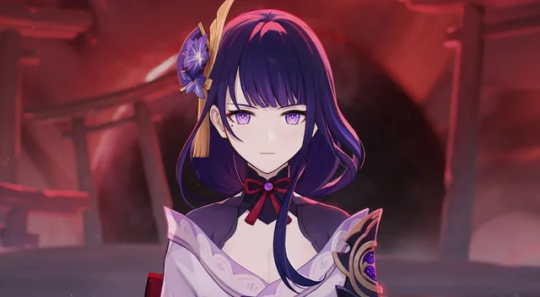
I think these two have a lot in common and their character arcs very much follow the same patterns, until they don’t. I say we are roughly at the moment where they are not linked anymore, where they get to be independent from one another (although i’d argue that Ei was never really influenced by Scaramouche where he definitely was obsessing over her for the sake of recognition and revenge but that’s just personal interpretation).
Ei’s arc, essentially, is that she loses her family and her purpose (being her sister’s weapon/right-hand woman) and copes with that by isolating herself (Plane of Euthymia) and reaching for impossible goals (eternity). She does not shy from violence in that path (actively starting and fueling a civil war, disregarding Fatui involvement despite the harm they caused, refusing to back down in the face of the misery she spreads).
Then, she meets the world anew. She finds a new loyalty (her people instead of her sister) and throws aside her old ideals and actively fights them and their incarnation (Narukami no Mikoto) to ensure a new path ahead instead of staying locked in the past (that’s her story quests).
Scaramouche/Wanderer, essentially, loses his family (Ei/the first boy/the smiths) and his purpose (holding the gnosis and being part of her world) and copes with it by isolating himself (Fatui’s allegiance and refusal to connect to anyone) and reaching for impossible goals (Archonhood as a revenge). He does not shy from violence in that path (his involvement with the Fatui and their numerous crimes against humanity, Inazuma’s civil war and his attempted deicide in Sumeru, amongst others).
Then, he meets the world anew. Literally, he’s made amnesiac and sees the world from a different perspective, and when he comes back to himself, he has already seen this new nation and Nahida. He finds new loyalty and family in Nahida and throws aside his own ideals and actively fight them and their incarnation (Shouki No Kami) to ensure a new path ahead instead of staying stuck in the past (Sumeru’s archon quest).
But Ei never cared about Scaramouche’s path. What he’s done has never been a concern to her, since she didn’t care about his actions in the civil war. When she learns he has the gnosis, she can not be bothered.
Scaramouche only steps away from her when he drops his quest for godhood. It might be unsatisfying to watch if you like a good revenge story that he just. Moves on, quietly, literally disappearing from her life, but he already wasn’t in there. There was never a room for him, her original idea was to destroy him when he expressed individuality — which proved to be too much and she set him free instead. (Also if you want to follow his revenge route, i’ll remind you that he still plans to fck Dottore up and that this is a story we can enjoy.)
Because Scaramouche’s story isn’t a story of revenge, or trauma, or rightful anger towards a neglectful family. Up to this point, it’s a story of learning, growing and finding yourself and your place in the world. It’s a coming-of-age story, basically.
(Yeah I’ll absolutely argue that Scaramouche, before Sumeru, is essentially throwing a tantrum.)
(Because he’s seen a lot of shit doesn’t mean he’s ever learned to cope with it and react to it in a non-violent, tantrum-like fashion.)
Ei’s story is a redemption story, of taking accountability, putting her head back into politics and forging ahead for her people this time and not in spite of them.
I think that Scaramouche and Ei’s arcs hold much more parallels than Kazuha and Scaramouche’s ones and that they diverge at a great time.
They start off at the same place (Inazuma), made anew by the same event (Makoto’s death), meet again during the same event they are both equally guilty of fueling (the civil war) and he finally gets the gnosis, a symbol of her. Then, he keeps going on spiraling down while Ei climbs up as a political and religious leader, finding the world has worth; while Scaramouche finds a new family and steps down from his ambitions. And now, they are too different people with different futures, different goals (leading Inazuma/killing the doctor), in different places (Inazuma/Sumeru) and the gnosis is gone, they are both moving on and away from the tragedies that made them.
#genshin impact#genshin spoilers#genshin scaramouche#genshin wanderer#wanderer genshin#scaramouche genshin#Raiden Shogun#raiden ei#genshin analysis#we just talking shit out there basically
18 notes
·
View notes
Text
no because fr if your answer to "systemic oppression made me disabled and dying since early childhood, me and others" is "There's beauty in imperfections" love i think you dramatically missed the point.
Jayce's speech to Viktor was bad.
IMO
So, the final speech Jayce gave to Viktor about finding beauty in imperfection, and how our flaws make us human, that’s a fine sentiment but the specific examples he used ruined it. He used Viktors disease as an example.
Viktor was dying from a disease caused by Piltover mining in the fissures polluting the air. It was a preventable disease forced onto him by a corrupt system. He was slowly and painfully falling apart. “I can feel myself rotting” type stuff. Was he supposed to have appreciated that?
Jayce wants him to have appreciated the simple beauty of dying a slow painful death while your best friend is too busy being a councilman to be with you and your mentor is roadblocking your only possible cure. That was the imperfection that he was misguided to want to solve? The show is really saying Viktor was misguided, or not appreciative enough of being human, to not want to die young. He was giving up his humanity when he fought to live.
Viktor should not have just accepted it, that isn’t just part of being human. It isn’t a beautiful flaw you learn to love. He did nothing wrong by taking his life into his own hands and taking every possible chance to live. Even when no one believed in him.
I’m sure there are more charitable interpretations but that line really rubbed me the wrong way.
#arcane#arcane season 2#arcane spoilers#arcane viktor#arcane jayce#that wasn't good imo#and yeah it was to anchor the show’s theme of love as the motivation for all actions#(is there anything as undoing as a daughter?)#(“why does anyone commut act others deem unspeakable? for love of course”)#but that was also a terrible way to conclude viktor lmao#like the man was fighting for Zaun's rights to a normal life and healthcare and was hit with “but you were still beautiful”
1K notes
·
View notes
Text
THIS
I originally thought she was a clear example of 'everyone can be the monster' and it made fck ton sense with the rest of the show, this fall into authoritarianism clearly matched Cait's or like, every other character. This feels like a criticism that can be extended tho, the show from s2 arc2 seems to genuinely ask of us to just,, forget that Piltover is an oppressive force!
Also, the friend i was watching with pointed out that she wasn't quite in sync with the actual rythme ambessa is setting. we thought it was hinting to her being naive and oblivious and actually realizing something was wrong in the future and switching back sides. Instead, she was evil all along and what not and that's really not as good of a narrative as the rest of the show. they could've shown Maddie as a normal, positive, sunshine girl getting corrupted (and coming back or not!) by a narrative of hatred and it would've been fire
I really dislike the plot twist of Maddie being a traitor/ spy. It changes the framing of her character.
Before the twist, she seemed like a commentary on how even the biggest ray of sunshine could happily go along with fascism and feel good about it. But with the twist it feelsl ike we are not meant to see her as a bad guy for the fascism, but for her being a spy
which in turn shifts attention away from Piltover's crimes
#arcane season 2#arcane spoilers#arcane maddie#the genuine deviation from Piltover is oppressive to WAS IT THOUGH was insane and i hate it#the show is great but we can have severe grievances with parts of it#nuance is hard i know
243 notes
·
View notes
Text
Hello!
I'm starting to have a few posts over so here's a masterpost i guess?
My posts are divided by fandoms so enjoy lmao (idk what I'm doing)
(it's under the cut because it's gonna be long af eventually)
be careful for spoilers!
Arcane posts
Caitlyn as a symptom of Piltover’s violence (i am rlly proud of that one imma be real)
Art as resistance in Arcane (and this one)
War as the great equalizer and Arcane (and this one lmao)
I really, really like Mel’s arc actually!
Stray thought about Caitlyn in season 2 ep 9 (not sure this one counts as analytic but i liked it)
Tea as a representation of power imbalance in Arcane
Should we call Jinx a terrorist?
Legend of Zelda posts
I love botw koroks
Sentient divine beasts hc (botw) (yeah this one hardly qualifies as analytic)
Hylia discourse (botw)
Genshin Impact posts
Democracy in Teyvat?
Thoughts on Furina’s skill
Scaramouche and Ei, parallel and divergent arc
Epic The Musical
Eurylochus, cowardice and responsibility
Athena, Odysseus, parallels and mirror arcs
Circe, misandry and power
Deltarune
my absolute beloved!
Susie is freedom
3 notes
·
View notes
Text
Art as resistance in Arcane
Disclaimer! I’m not an artist, I don’t study art, I will have the most obvious takes on art and will avoid discussing any technicalities of art! I wholeheartedly beg for someone to come and tell more stuff about art in the comments/reblogs, either because you agree or think I said a lot of sht throughout this post :D
What I am, however, is a student in political science working towards my master’s degree! Which clearly doesn't mean you have to just eat what I’m saying without critical thinking but I do have some idea of what I’m saying and I will be quoting my sources.
Also, heads up, spoilers ahead for the entire show.
So! Art and resistance and Arcane.
One of my favorite things in Arcane is the worldbuilding, because it’s exceptionally well done. I do not know if 100% of it was 100% intentional or if some things just happened to be there but I can not say anything about the way the show writes the inequalities between Piltover and Zaun and introduces the two parts of the city. It doesn’t mean we’re not allowed our grievances with the show of course, but i’d defend that this element of it is almost flawless.
And thus, let us talk about art as domination, art as resistance.
So! How is art resistance in Arcane? Well in multiple ways of course!
It's very obvious in Paint the Town Blue, where art very much is the weapon of rebellion (that and molotovs i guess).
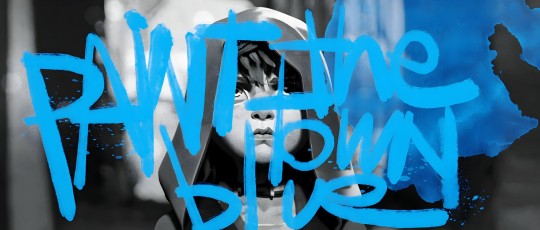
Blue is the symbol, the rallying force, Jinx's blue is the answer to the enforcers’ blue and Zaunites riots are the answer to Piltovian oppression.
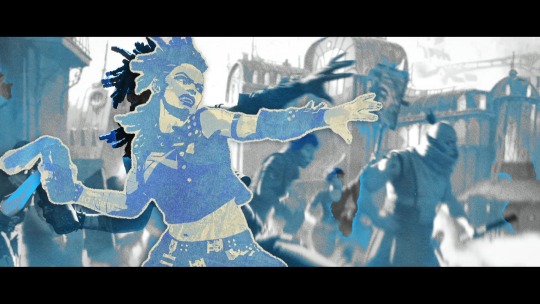

Jinx's monkeys are known in Piltover, it's the sign of her bombs and it's a threat. Since the assault on the council, she's proven herself to be a terrible, terrible threat.
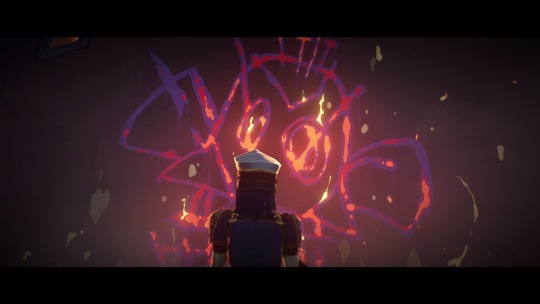
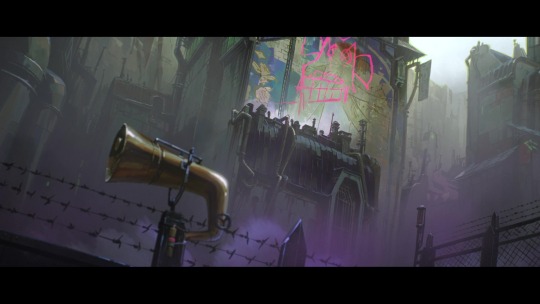
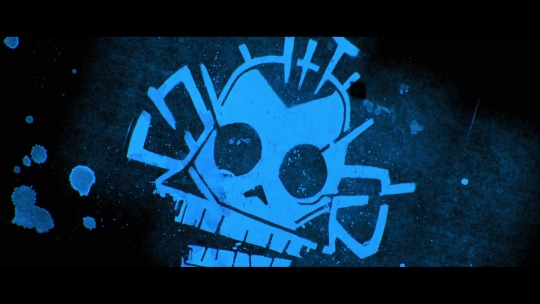
The spray paint also is the weapon, both because it creates art and because it fights the representation of the situation.
Representations are how we are shown a situation, and therefore influence greatly the way we picture it and that immensely influences how we decide to act upon an event. So this!
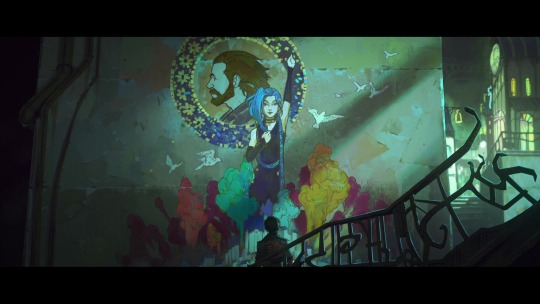
is reframing Jinx as Vander's legacy, and it's fake because revolts are not Vander's heritage and Jinx is not walking in Vander's footsteps until Isha comes along, but it's efficient. Vander was a respected man in the Undercity while Silco was violent and brutal with Zaunites.
And it works really well, else the Jinxters would simply not be, let alone that many.
And this!
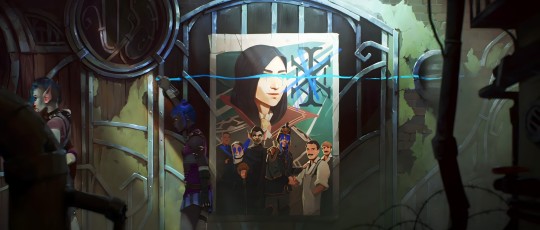
is also a fight for representation, but it's against Piltovian propaganda. It's still very much Jinx Blue versus Piltover Blue, it's fighting the idea of a consensual intervention based on cooperation between Zaun and Piltover; fighting the idea of kind, violence-i-dont-know-her enforcers by demonizing their picture; showing Caitlyn as blind but not untouchable and refusing to let Piltover expose their propaganda in their city. This is powerful, art and its materials are used as a weapon against Piltover's domination.
And in an even more obvious way, these
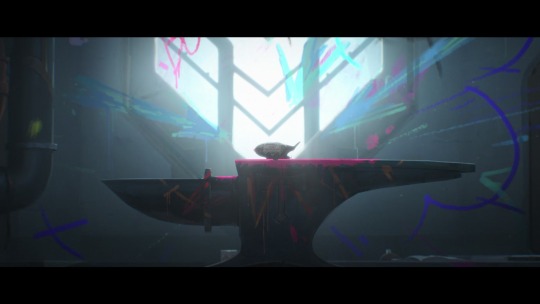

are paints and they’re here to say ‘you’re safe nowhere, expect us’, both in season 1 and season 2. Season 1 especially is Jinx mocking Piltover’s core values as the city of progress.
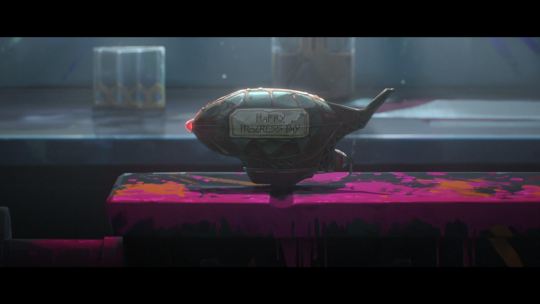
In a slightly less obvious way, this mural:

is resistance too, because it’s fighting how Piltover and the chembarons would describe them: punks, terrorists, hooligans, you get it. It also is because it’s motivational for the resistant forces (the Firelights).
Contestation and resistance are not always all out wars and permanent riots, and silence does not mean total submission. Resistance is to be found in everyday life, through puns and rumors, sabotages and hidden acts of refusal. (James C. Scott, The Arts of Resistance)
There also exist other ways, more subtle, to use art as resistance.
I’m gonna start with my sources here: Pierre Bourdieu. And I’m going to have to put another disclaimer right there: I did not read his work. I was taught it by my university teachers though, and that’s what I’m going to be using as my actual source material.
Well I did read some but I did not pick up the book we’ll be referring to today: La Distinction (The Distinction). Bourdieu said a lot of things but the only one we’re going to focus on in this post is the idea of the distinction (strap in, I have no idea if I can summarize that correctly).
Basically and very summed up, social groups and classes are ranked in hierarchies and all try to not be associated with the lower groups. To avoid this, groups adopt habits that mark them socially, like people who can afford to wear expensive brands will do so because it’s a social marker. It’s also seen in hobbies: not everyone is used to going to museums, not everyone enjoys going to the opera. I learned to go to a museum and enjoy it because my parents are teachers and artists and thus they wanted me to know. It’s a marker of my family’s place in society and social ladder, basically we are automatically branded as cultured people — not saying we are more than anyone else but our culture was in adequation with the ‘good culture’. Because, yes, of course ways to act, consume and be are ranked too, based on who does what. That’s cultural domination. Each group’s cultural practices are ranked in society and are more or less valued, and it very much follows the social ladder placement. Basically, the more a group is valued, the more its practices are seen as good and legitimate in society.
(I’m so sorry this took forever but there is no summarizing Bourdieu in 4 lines)
With that knowledge! It will hopefully make sense when I say that maintaining your autonomy against the pressure of cultural domination is resistance. Basically, if you refuse to see opera as a superior form of entertainment and instead think guy rapping some verses he came up with on the street is better and socially more valuable, that’s resistance. Doesn't mean it's gonna change the world but hey, resistance still.
So pieces of art in the Undercity are refusal of that cultural domination. These refuse to let Piltover be the place of glory, of beauty, refuse to abide by Piltover’s standards of beauty too, because Piltovian art looks like this!
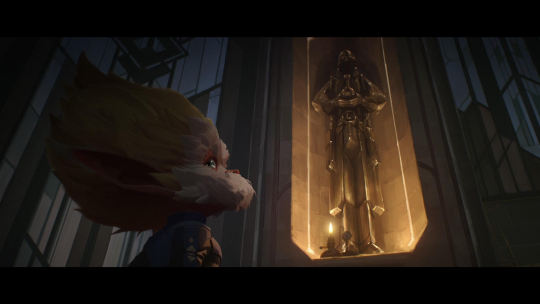
It’s all golden and smooth and uniform, elegant and beautiful. This one statue:
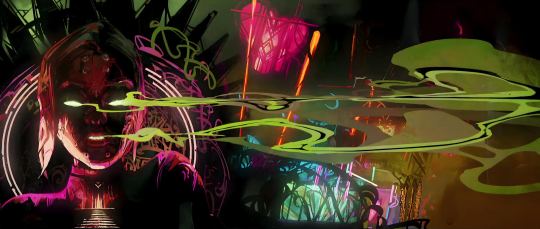
is of Margot, one of the chem barons (same hair, same piercings) and it’s part of the vent system. For one, It means that something Piltover set in place was reclaimed by Zaunites — although not any Zaunite but a chem-baron, multi layered power dynamics at play out there! — but also, look at it. It’s rough around the edges, made of multiple fragments pieced together (you can see it on the chin and across her forehead), it’s sharp and angular and it certainly doesn’t abide by Piltover’s norms for artworks. Statues are associated with powerful people. Margot’s is different from Piltover’s, because she’s not a Piltie and she doesn’t crush Zaun like Piltover does, but this statue still means that art is in Zaun. Not quite the same, but no less pretty and valuable and a statue is still a signifier of power, just like in Piltover.
Same goes for Vander’s statue, all surrounded by pipes and jagged and in the dark too, both of them, contrasting with Piltover’s light and gold!
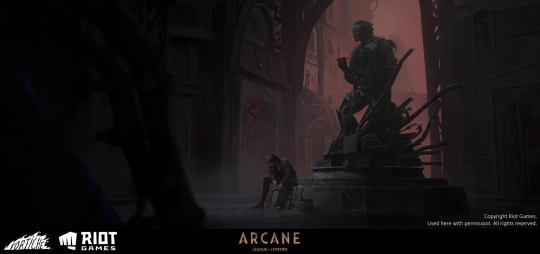
(this is also domination though. Margot has this statue because she is a chem baron, and she is weaponizing art to increase her own power if only thanks to popularity. She associates herself with clean air for a reason!) (yeah because Cait’s reaction to seeing it makes me think Margot didn’t get permission from the Kiramman before getting that statue done.)
(Also, Bourdieu argued that groups try to reach for the culture of the higher groups in society, to distance themselves from the lower groups. Power in Zaun is also shown through statues, because Piltovian standards of what is great art meant to symbolize great people still seeps through society and trickles down to Zaun.)
(admittedly a severe part of this post is over expanding over what the show actually tells us but the worldbuilding is so coherent that it’s very easy to just push the boundaries of the world we see.)
Also, these are art!
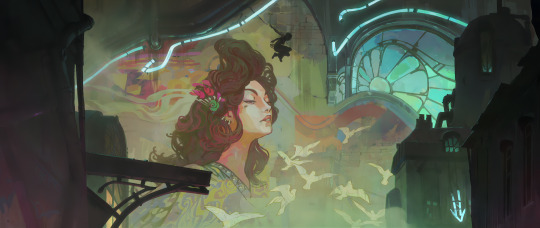
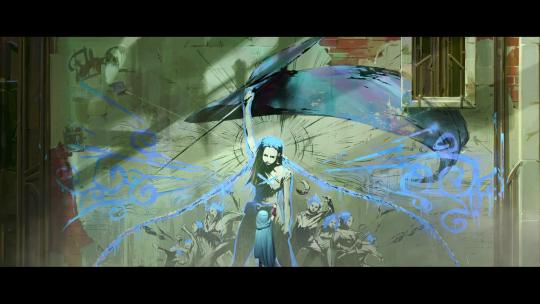
They’re graffiti, street arts made on walls and with spray paint. If you compare it to, let’s say, Mel Medarda’s own painting, not quite the same ambience!
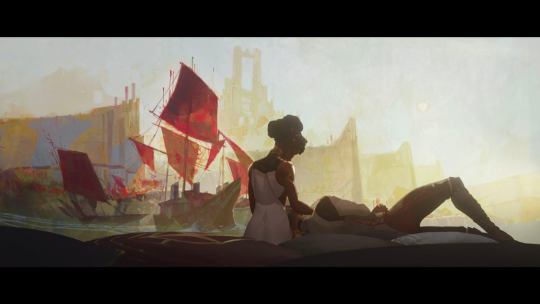
Mel’s art is clean and refined, with paint and a palette and a knife and paintbrushes that are all very expensive, and careful and on a canvas and representing a concrete display of power from Noxus. This is a display of wealth, and it sets the tone for what is “great” art in Piltover (one’s position often determines the value of what they do in life, and Mel is the most powerful person of Piltover, therefore her art is the most valued art there can be) and standards of greatness trickling down through society, this is going to impact Zaun’s standards of beauty too, you get the drill.
So the murals in Zaun are resistance! And these are classic takes on street art: get the art away from the spaces monopolized by the upper classes; bring it to the public, to the street, to the lower classes; challenge the beauty standards; art as expression of a self no matter if it’s with a canvas; accessible art to everybody. This art is not a hyper realistic display of power, but it’s beautiful and it’s art nonetheless.
This also follows the same logic.

I’ll add extra kudos for that image because the song Rebel Heart has a very cathartic “destruction is art!” line and i very much think it’s real. Sometimes, doing great, beautiful and meaningful things means destruction!

And finally, to go back to Mel and art being the most obvious weapon of resistance ever, about maintaining your autonomy against authority and what it tells you is ‘greatness’, I’ll give you these two pictures and rest my case.
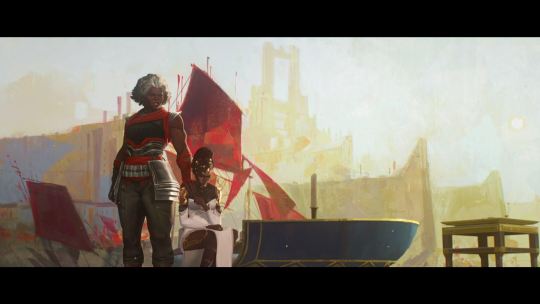
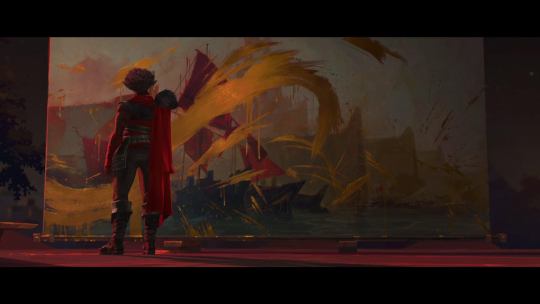
#arcane#arcane spoilers#arcane season 2#arcane art#arcane analysis#arcane piltover#arcane zaun#piltover and zaun#jinx arcane#i hope y'all enjoy#i had a lot of fun but I'm not the most qualified on the matter so please please please contribute to this conversation
40 notes
·
View notes
Text
Yes yes let's sit down, however I raise you: Powder's rebirths and moment of change are blue. Jinx's are pink/red, because Violet made Jinx.














Sit down we’re going to talk about how blue represents rebirth and change for Jinx
3K notes
·
View notes